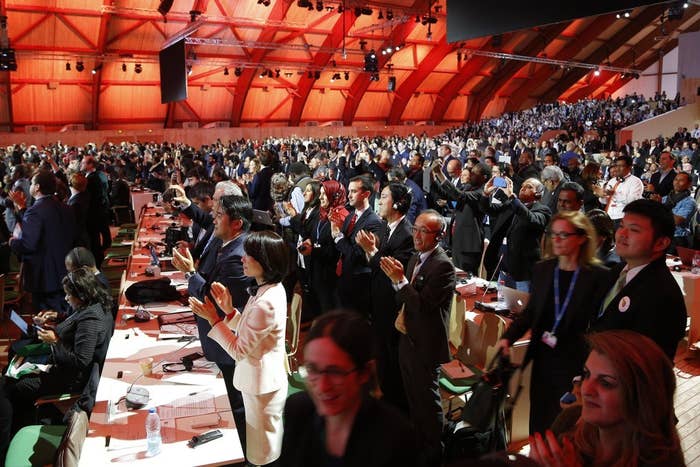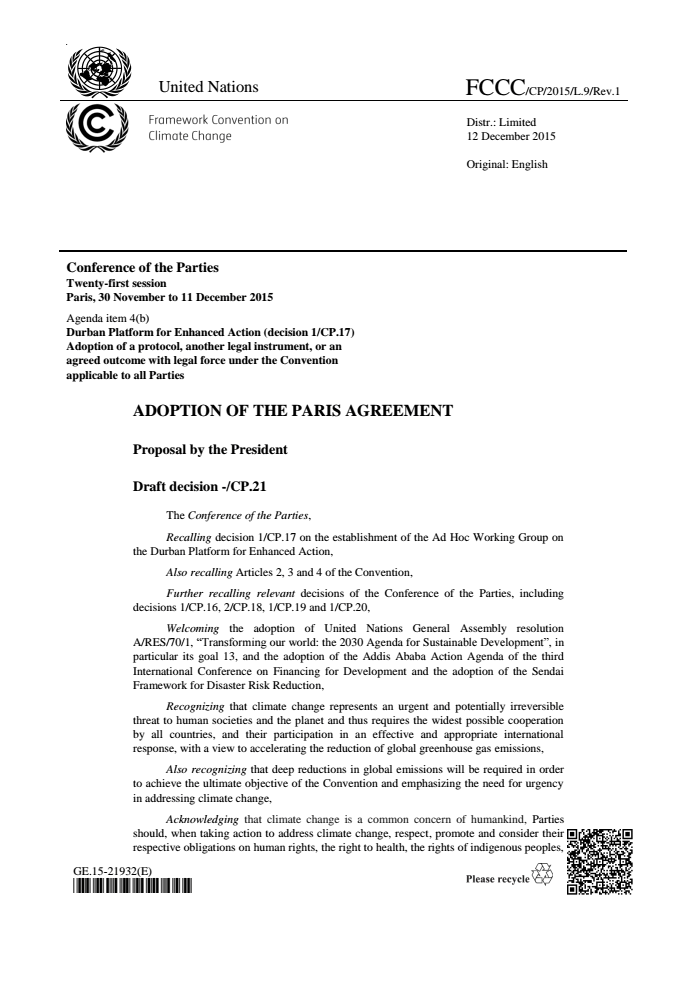
LE BOURGET, France — In a historic moment decades in the making, the countries of the world on Saturday night unanimously adopted a landmark agreement designed to halt human-caused climate change.
The 31-page agreement touches on an array of issues from emissions to economics, and was hammered out over two weeks of arduous negotiations in a Paris suburb.
While the mood at the negotiations was generally optimistic, the agreement came down to the wire; it was supposed to be finalized Friday, but was repeatedly pushed back Saturday.
Final approval happened around 7:30 p.m. local time.
"I see no objections," Laurent Fabius, the French official who led the talks, said as he lifted a green gavel. "The Paris agreement is adopted."
The packed room erupted in cheers as Fabius's gavel came down.
Across the sprawling conference site, observers watching the moment on closed circuit TV yelled, hugged, and cried.
The moment was the culmination of decades of work. The meeting — officially called "COP21" because it is the 21st annual gathering of its kind — followed notable but ultimately frustrated attempts to reach a similar agreement in Lima, Peru, last year and Copenhagen, in 2009.
"Today, more than 190 countries came together to adopt the most ambitious climate change agreement in history," the White House said in a statement.

The agreement includes a host of provisions that seek to change the way the world uses fossil fuels and emits greenhouse gases.
Among the most signifiant provisions in the agreement is the goal to peak greenhouse gas emissions "as soon as possible."
The agreement also places significant responsibility on developed nations, which are on the hook to "provide financial resources" to help developing nations adapt to and deal with climate change. Specifically, developed countries are supposed to provide at least $100 billion per year by 2020, which they previously promised, with future reviews evaluating the needs of developing countries.
The proposal also includes the goal of keeping global temperature rise "well below 2 degrees C" compared to pre-industrial levels, with the added aim of limiting it to 1.5 degrees Celsius.
Temperature was one of the buzziest topics at the talks; as they began, 2 degrees Celsius was widely seen as the goal, but over the two weeks negotiators were in Paris the more aggressive target emerged and, to the surprise of some, gained significant traction.
Many experts, however, have suggested that such an ambitious target is unobtainable because temperature rise lags behind emissions; yhe quantity of emissions needed to pass a 1.5-degree rise, the argument goes, has already been created. Some have also pointed to the 2 degrees Celsius goal as an arbitrary marker, rather than a scientific limit.
Still, most people at the conference Saturday seemed satisfied with the way the agreement ultimately handled temperatures. In a conversation with BuzzFeed News Saturday afternoon, Maldives Minister of Environment and Energy Thoriq Ibrahim praised the inclusions of the 1.5-degree target. Ibrahim was part of a coalition of small island nations that, fearing rising sea levels will devastate their countries, pushed aggressively for the more ambitious target and scored a major coup when it was written into the agreement.
Some scientists also characterized the temperature debate as beside the point. On Friday, for example, NASA climatologist Bill Patzert told BuzzFeed News in an email that the world probably couldn't cap temperature rise at 1.5 degrees Celsius, but added that, numbers aside, the talks still represent "a groundswell building among almost all nations of the morality of capping man-made climate change."
Another provision of the agreement would require countries to regularly report their emissions. The deal also states that countries will be held accountable in a "non-intrusive, non-punitive manner, respectful of national sovereignty."
The manner in which countries would be required to comply with the agreement was also a major issue at the talks, with an array of views emerging on what exactly should be legally binding. U.S. officials — including Secretary of State John Kerry and chief negotiator Todd Stern — had both suggested countries should be legally required to work toward certain goals, but that the goals themselves should not be legally binding.

Hundreds of organizations and thousands of activists with a stake in the climate talks attended the Paris negotiations, and the response to the final agreement was, unsurprisingly, not uniform.
Still, many praised the agreement. Al Gore, who was at the talks Saturday, characterized the agreement as historic.
"Today, the nations of the world concluded a bold and historic agreement, clearly demonstrating that the global community is speaking with one voice to solve the climate crisis," Gore said in a statement. "Years from now, our grandchildren will reflect on humanity's moral courage to solve the climate crisis and they will look to December 12, 2015, as the day when the community of nations finally made the decision to act."
Many prominent organizations shared Gore's optimism. In a statement, the Sierra Club called it a a "turning point for humanity," and added that the agreement marks "the beginning and not the end."
Advocacy group Avaaz had similar praise, saying in a statement that the deal would "represent a turning point in history, paving the way for the shift to 100% clean energy that the world wants and the planet needs."
Mohamed Adow, of advocacy group Christian Aid, told reporters Saturday that "the era of our politicians burying their head in the sand is now over."
Samantha Smith, of WWF, praised the proposal's inclusion of a reference to keeping global temperatures below 1.5 degrees Celsius.
"1.5 is critical and it's very very positive that this latest draft sends this strong signal," Smith said.
However, Tim Gore of OxFam criticized some of the financial provisions and said it still left some of the people most impacted by climate change vulnerable.
Greenpeace was more measured in its response. Executive Director Kumi Naidoo told reporters Saturday that the deal was not perfect, but still "puts the fossil fuel industry on the wrong side of history." In a statement, he added that "the wheel of climate action turns slowly, but in Paris it has turned."
"This deal alone won't dig us out the hole we're in," he added, "but it makes the sides less steep."


